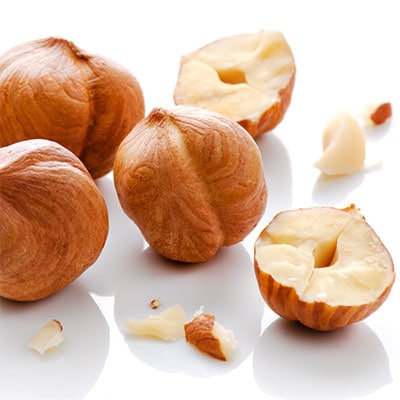Hazelnuts are also known as filberts.
 Background
Background
- Hazelnuts are members of the Betulaceae botanical family.
- Turkey is the number one producer of hazelnuts.
Nutrition
- Hazelnuts are an excellent source of manganese, copper, and vitamin E, and a good source of thiamin, magnesium, and fiber.
- Manganese promotes wound healing and cartilage and bone formation.
- Copper supports nervous system function, iron metabolism, energy production, and formation of bone, collagen, and connective tissue.
- Vitamin E is an antioxidant which aids immune function and formation of blood vessels.
- Thiamin converts food into energy and assists in nervous system function.
- Magnesium assists in blood pressure and blood sugar regulation. It also supports immune and nervous system function.
- Fiber promotes a healthy digestive system by normalizing bowel movements while also helping to maintain a healthy weight.
How to Purchase, Prepare, and Store
- Purchase whole hazelnuts year-round at grocers. Other hazelnut products available include hazelnut flour, hazelnut butter, and hazelnut oil.
- Prepare as directed in your recipe.
- Hazelnuts can be added to salads, grain dishes, and baked goods, or eaten plain as a delicious snack.
- Store hazelnuts in airtight jars in a cool, dry place away from direct sunlight. They can also be stored in the refrigerator or freezer for up to one year.
Nutrition Facts
1 oz. hazelnuts, 21 kernels
- Calories: 178
- Protein: 4.2 g
- Fat: 17.2 g
- Carbohydrate: 4.7 g
- Fiber: 2.7 g
- Calcium: 32.3 mg
- Iron: 1.3 mg
- Magnesium: 46.2 mg
- Phosphorus: 82.2 mg
- Folate: 32 µg
- Vitamin A: 0.2 µg
Via fdc.nal.usda.gov
Recipes
Request an Appointment